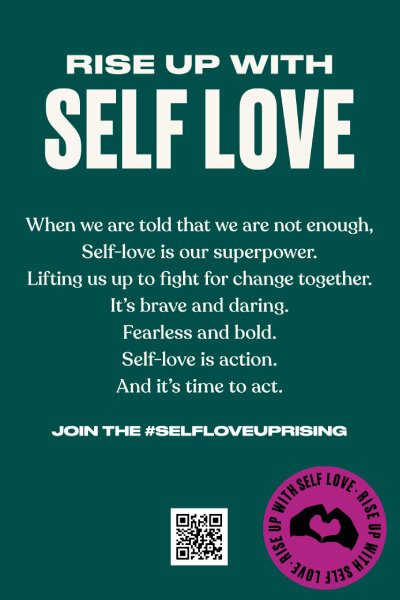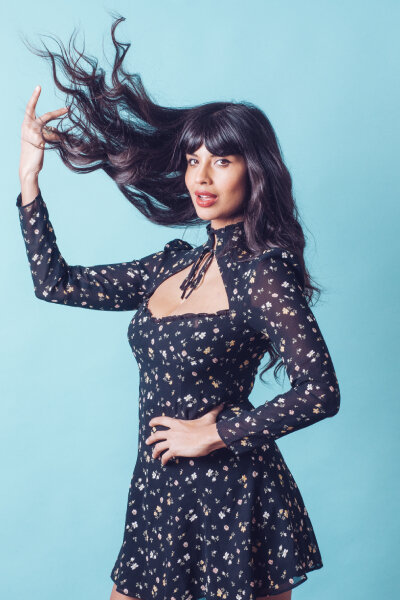Who holds the power in defining a woman’s worth and whether she’s deserving of love? Not the weighing scale. Not others. No one but herself. Actress and activist Jameela Jamil and “The Millennial Therapist” Sara Kuburic tell us more about cultivating safe spaces for conversations on self-love and positive change.
Make self-love your superpower
“[Self-love] is an ongoing journey towards it and it’s a difficult thing to achieve, especially when as a woman, you are taught to be hated and to hate yourself. For me, I’m still on my journey to self-respect first; and with the final destination of self-love,” revealed Jameela.
The actress, who’s known for playing Tahani Al-Jamil in the award-winning Netflix series The Good Place and for founding “I Weigh”, a movement that champions radical inclusivity, shines in her latest role as the face of The Body Shop’s Self-Love Uprising campaign and has zero qualms about sharing refreshingly honest, painful truths on self-love with the rest of the world.
Together with existential psychotherapist and mental health advocate Sara Kuburic, both women have partnered with the brand to shed light on The Body Shop's Global Self-Love Index — a groundbreaking study conducted by the brand and market research firm Ipsos that explored different dimensions of self-love and involved over 22,000 respondents in 21 countries — as well as encourage people all around the world to rise up to self-love.
Sharing her personal self-love experiences with the media including Clozette over Zoom, Jameela revealed: “I just turned 35 last week, yet I'm still finding little bits of toxic messaging inside of my brain! It’s like I’m taking tweezers and pulling [these thoughts] out of me. Even then, we have to go forward for the experience. It’s going to be a wild ride and I hope to live a long time to find as much colour in my life as possible as I’ve spent enough time being an obedient girl with depression."
In truth, self-love is far from a pretty dish that’s served to you on a silver platter. Even then, this tough rollercoaster ride is something that we must experience on our own to realise why it’s not our weakness, but rather, our superpower.
Define beauty on your own terms

Together with existential psychotherapist and mental health advocate Sara Kuburic (right), Jameela Jamil is partnering with the brand to shed light on The Body Shop's Global Self-Love Index. (Photos courtesy of The Body Shop)
“I have no idea what beauty is! Beauty is subjective; beauty is transient. It’s inside and out and it’s not for any individual or any group of individuals to decide what is beautiful,” confessed Jameela after she was asked to define what beauty meant to her.
Admittedly, this is easier said than done; especially if we were constantly fed with picture-perfect photos of conventionally “attractive” models in beauty advertisements. Speaking of which, unrealistic portrayals of beauty was one of the key findings highlighted in The Body Shop Global Self-Love Index too, which reported that a majority of people globally think the beauty industry can have negative impacts on self-confidence. Among the largest contributors of negative impact on the beauty industry, unrealistic claims made the top spot, followed by the use of airbrushed or photoshopped images.
Having openly called on fellow celebrities to stop airbrushing their photos in the past, Jameela shared: “When we edit our own photographs, we’re setting ourselves up for failure. I don’t want airbrushing because it makes me feel bad about myself. I need to get used to seeing my pores and wrinkles. Women are inherently gorgeous in our own special way and I want us to feel better about things like lines and a lack of symmetry. As an ethnic minority, I want to look like where I’m from and I want to look that way with pride.” Beauty is beyond a certain shape, colour or size. We must define beauty on our terms — not others’.
Celebrate authenticity and set boundaries
From connecting with loved ones over Zoom to organising meaningful “live" sessions on Instagram, there’s no doubt that the World Wide Web has been incredibly helpful in allowing us to stay connected with one another especially during this pandemic. However, what happens when social media goes from being helpful to harmful? How can we ensure that we do not fall prey to viral social media “challenges” and trends that can have a negative impact on our mental health?
Referring to another significant finding in The Body Shop’s Global Self-Love Index, which found that high social media users have lower levels of self-love, Sara advised: "We can’t replace genuine connections with social media. It’s crucial for us to have boundaries on what content we follow, what content we support and what platforms we support just by being on them, and how much time we are spending on them. We don’t have agency on what’s thrown our way all the time, but we can take some responsibility for at least what we’re choosing to follow or not follow.”
And when it comes to taking charge of the content that we consume on our digital screens, Jameela knows a thing or two about this. When asked about her self-love routine, the actress playfully shared that what she does is "sit in her bedroom, on her phone, and mute and unfollow people." "I find that to be very good for my skin. It makes my skin softer and smell better because I get rid of all of the toxins from my timeline,” she explained candidly.
That aside, the actress also believes in writing down a list of things that make her "a whole human" on a regular basis. “I have to keep grounding and reminding myself for who I am and not what I owe to others in my appearance,” she added.
As for Sara, setting boundaries is her favourite form of self-love routine. She revealed: "I just think there’s no better way to show myself self-love than to not do the things that I don’t want to do. Having that space to be alone and protect my time has been really huge during this pandemic given my work. And of course, minding the way I speak to myself.” Be conscious of your consumption; seek genuine authentic connections, dare to say “no”, and establish boundaries to protect yourself and your mental health.
Speak words of kindness to yourself and others

The Body Shop’s Self-Love Uprising campaign aims to tear down the barriers to self-love in ourselves, the beauty industry and in the world. (Photo courtesy of The Body Shop)
“Not thin enough. Not smart enough. Not beautiful enough.” We are often our harshest critics in the way we speak to ourselves and whenever we repeat these damaging narratives in our heads, we’re building up even more barriers that prevent us from achieving self-love.
“Someone once told me that words have authority over thought. Now, I am no neuroscientist but I have found it to be true. Once you learn to listen out for the smart, inner bully in your brain that’s planted by society, you start to spot it all the time and think, 'God, would I say that to a woman who I love or respect? Would I tell her that she’s too ugly for love or too fat to try for that job?' I’d never say that to someone I respect, so why am I saying it to myself? There’s no one here to protect me because I am saying it in the privacy of my own company,” shared Jameela.
Adding that she knows she’d probably come off as “quirky” when doing so in public, Jameela shared that interrupting her negative thoughts by telling herself: “No, you can’t talk to me that way! ” out loud is what it takes for her sometimes to silence “the abuser” in her head.

“Would I tell [a woman whom I love and respect] that she’s too ugly for love?' I’d never say that, so why am I saying it to myself?” shared Jameela. (Photo courtesy of The Body Shop)
“I am entitled to love and respect and joy just as much as anyone else. We need to not only be careful of what we say to ourselves, but we need to be very careful about what we say to each other. Try to switch your compliments to being how funny or smart they are. This will genuinely start to build up not only their value system about themselves but your own. We should talk like that all the time and then it will become second nature,” revealed Jameela.
Further weighing in on the importance of creating healthy dialogues with ourselves and others, Sara advised: “I think it’s not just important how you speak to other people about their bodies, but how you speak out loud about your own body as well. We need to be careful about how we’re modelling behaviours to younger women. Are we sitting there picking ourselves apart or are you finding something to celebrate? We are so much more than our physical appearance and it’s about time we start acknowledging that.”
Before the Zoom interview ended, Jameela declared triumphantly: “12 years ago, I never used to be on a panel full of women. It used to be filled with men asking me boring questions about my breasts. This is wonderful and I’m so happy with our progress!"
Indeed, pursuing progress rather than perfection is something that all of us need to do so much more of. May we rise up to self-love and find joy in being beautiful "works-in-progress”.
*This interview has been edited for brevity and clarity.
Inspired to join The Body Shop’s #SelfLoveUprising movement? Simply share your self-love journey by tagging #SelfLoveUprising and @TheBodyShopSG on social media to show your support.
Comments, questions or feedback? Email us at [email protected].








